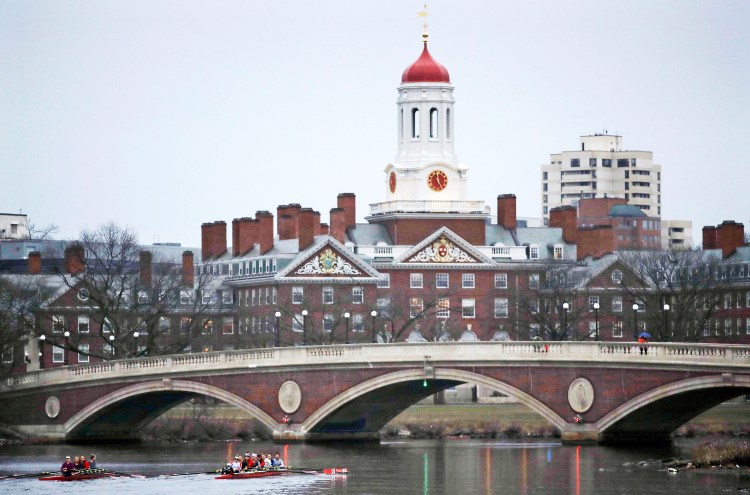WASHINGTON — The Justice Department on Thursday sided with Asian-American students suing Harvard University over the Ivy League school’s consideration of race in its admissions policy, the latest step in the Trump administration’s effort to encourage race-neutral admissions practices.
The Justice Department said in a court filing Thursday that the school has failed to demonstrate that it does not discriminate on the basis of race.
The department’s “statement of interest” was in a case filed in 2014 by Students For Fair Admission, which argues that one of the world’s most prestigious universities discriminates against academically strong Asian-American applicants.
Harvard didn’t immediately respond to a request for comment, but the school has disputed the claims in previous filings.
The Supreme Court permits colleges and universities to consider race in admissions decisions, but says it must be done in a narrowly tailored way to promote diversity and should be limited in time. Universities also bear the burden of showing why their consideration of race is appropriate.
But in Harvard’s case, Justice Department officials said, the university hasn’t explained how it uses race in admissions and has not adopted meaningful criteria to limit the use of race.
Attorney General Jeff Sessions said, “No American should be denied admission to school because of their race.”
Sessions argued the school’s use of a “personal rating,” which includes highly subjective factors such as being a “good person” or “likeability,” may be biased against Asian-Americans. Sessions said the school admits that it scores Asian-American applicants lower on personal rating than other students. Sessions also argued that Harvard admissions officers monitor and manipulate the racial makeup of incoming classes.
“The Supreme Court has called such attempts to ‘racially balance’ the makeup of a student body ‘patently unconstitutional,'” Sessions said in a statement.
Edward Blum, president of SFFA, hailed the administration’s action. “We look forward to having the gravely troubling evidence that Harvard continues to keep redacted disclosed to the American public in the near future,” he said.
Blum is a part-time resident of Maine who has been challenging race-based policies for more than 25 years, starting with a suit alleging that Texas officials had engaged in “racial gerrymandering” in drawing the lines of a Houston Congressional District. Blum had run as a Republican in the the district and lost and the Supreme Court ultimately ordered Texas to redraw the lines for three districts.
He subsequently established two non-profit foundations to pay for similar lawsuits, including one in Alabama that led to a 2013 Supreme Court ruling that struck down a key provision of the Voting Rights Act of 1965. Other lawsuits have challenged college admissions standards the consider race.
He and his wife regularly vacationed in Maine since honeymooning in the state in 1981. They live in South Thomaston part of the year, and relocate annually to Florida to avoid Maine taxes and the harsh winters.
The Justice Department’s court filing opposes Harvard’s request to dismiss the lawsuit before trial. The department is separately investigating Harvard’s admissions policies, a probe that could also result in a lawsuit.
The filing follows a July decision by the Justice and Education departments to abandon Obama-era guidelines that instructed universities to consider race in their admissions process to make the student body more diverse. Democrats criticized the decision, saying that the Trump administration was taking away protections for minorities.
Send questions/comments to the editors.


